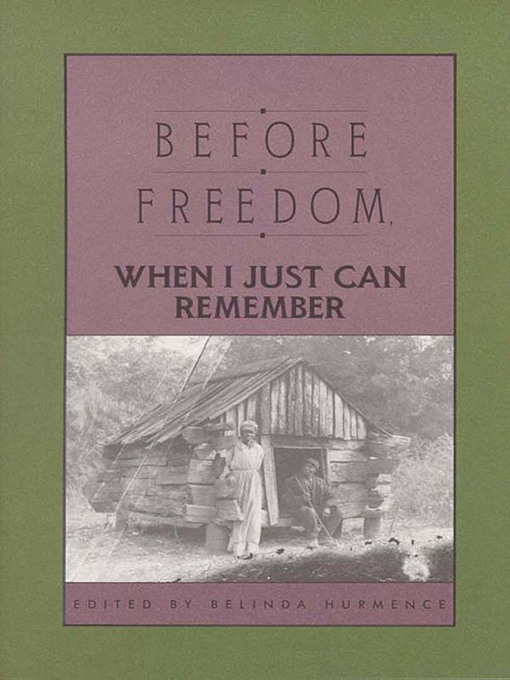- All Magazines
- Popular Magazines: Always Available
- Cooking and Food Magazines
- Craft Magazines
- News and Politics
- See all magazines collections
Before Freedom, When I Just Can Remember
Personal Accounts of Slavery in South Carolina
-
Creators
-
Publisher
-
Release date
January 7, 2011 -
Formats
-
Kindle Book
-
OverDrive Read
- ISBN: 9780895874078
-
EPUB ebook
- ISBN: 9780895874078
- File size: 1710 KB
-
-
Languages
- English
-
Reviews
-
School Library Journal
September 1, 1989
YA- -From 284 Federal Writers' Project interviews gathered during the 1930s, Hurmence has edited 27 pieces in which ex-slaves from South Carolina discuss their homes, chores, masters, families, and celebrations during slave times. As she notes in her introduction, the former slaves' seeming nostalgia for old times may have resulted from their ages (all were over 80 at the time of the interviews) and Depression-linked poverty, the reality that freedom often meant sharecropping and violence from the KKK, and the fact that their interviewers were white. Nonetheless, the collection offers students a chance to use readable primary sources to research details of the everyday lives of Southern slaves.- Alice Conlon, University of Houston -
Library Journal
May 15, 1989
Selected from the Federal Writers' Pro ject slave narratives, this first-hand ac count of slavery features interviews with 27 former South Carolina slaves who were at least ten years old when they were freed. It is a successor to Hurmence's My Folks Don't Want Me To Talk about Slav ery (1984).--MRCopyright 1989 Library Journal, LLC Used with permission.
-
Formats
- Kindle Book
- OverDrive Read
- EPUB ebook
Languages
- English
Loading
Why is availability limited?
×Availability can change throughout the month based on the library's budget. You can still place a hold on the title, and your hold will be automatically filled as soon as the title is available again.
The Kindle Book format for this title is not supported on:
×Read-along ebook
×The OverDrive Read format of this ebook has professional narration that plays while you read in your browser. Learn more here.


